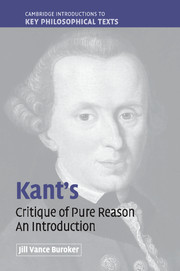Book contents
- Frontmatter
- Contents
- Acknowledgments
- List of abbreviations
- 1 Introduction to the critical project
- 2 The Prefaces and the Introduction
- 3 The Transcendental Aesthetic
- 4 The Metaphysical Deduction: identifying categories
- 5 The Transcendental Deduction of the categories
- 6 The Schematism and the Analytic of Principles I
- 7 The Analytic of Principles II
- 8 Transcendental illusion I: rational psychology
- 9 Transcendental illusion II: rational cosmology
- 10 Transcendental illusion III: rational theology
- 11 Reason and the critical philosophy
- Conclusion: Kant's transcendental idealism
- Works cited
- Index
10 - Transcendental illusion III: rational theology
Published online by Cambridge University Press: 05 June 2012
- Frontmatter
- Contents
- Acknowledgments
- List of abbreviations
- 1 Introduction to the critical project
- 2 The Prefaces and the Introduction
- 3 The Transcendental Aesthetic
- 4 The Metaphysical Deduction: identifying categories
- 5 The Transcendental Deduction of the categories
- 6 The Schematism and the Analytic of Principles I
- 7 The Analytic of Principles II
- 8 Transcendental illusion I: rational psychology
- 9 Transcendental illusion II: rational cosmology
- 10 Transcendental illusion III: rational theology
- 11 Reason and the critical philosophy
- Conclusion: Kant's transcendental idealism
- Works cited
- Index
Summary
Kant has a complex attitude toward religion. One one hand he consistently rejects religious belief based on superstition, fanaticism, and anthropomorphism. He especially opposes faith that appeals to emotion at the expense of reason. As Allen Wood explains, “Kant is willing to condone a faith which bases itself on special divine revelation only insofar as the content of its revelation accords with the precepts revealed naturally to every human being through the faculty of reason.” And in keeping with transcendental idealism, Kant rejects the possibility of metaphysical knowledge of God. As he famously puts it in the 1787 Preface: “Thus I had to deny knowledge in order to make room for faith” (Bxxx). On the other hand, although rational theology is a pseudoscience, the idea of God serves two legitimate purposes. First, it is necessary for moral faith. As rational moral agents, we recognize the moral law to pursue the highest good. But we can realize our purposes only within the world of nature. Thus moral action makes sense only on the assumption that nature is in harmony with morality. For Kant, this implies that nature is governed by a supremely perfect being. Kant elaborates on this point in the Lectures on the Philosophical Doctrine of Religion as well as his ethical writings. In its second role, the idea of God has a regulative function promoting the inquiry into natural purposive systems in empirical science.
- Type
- Chapter
- Information
- Kant's 'Critique of Pure Reason'An Introduction, pp. 264 - 283Publisher: Cambridge University PressPrint publication year: 2006



